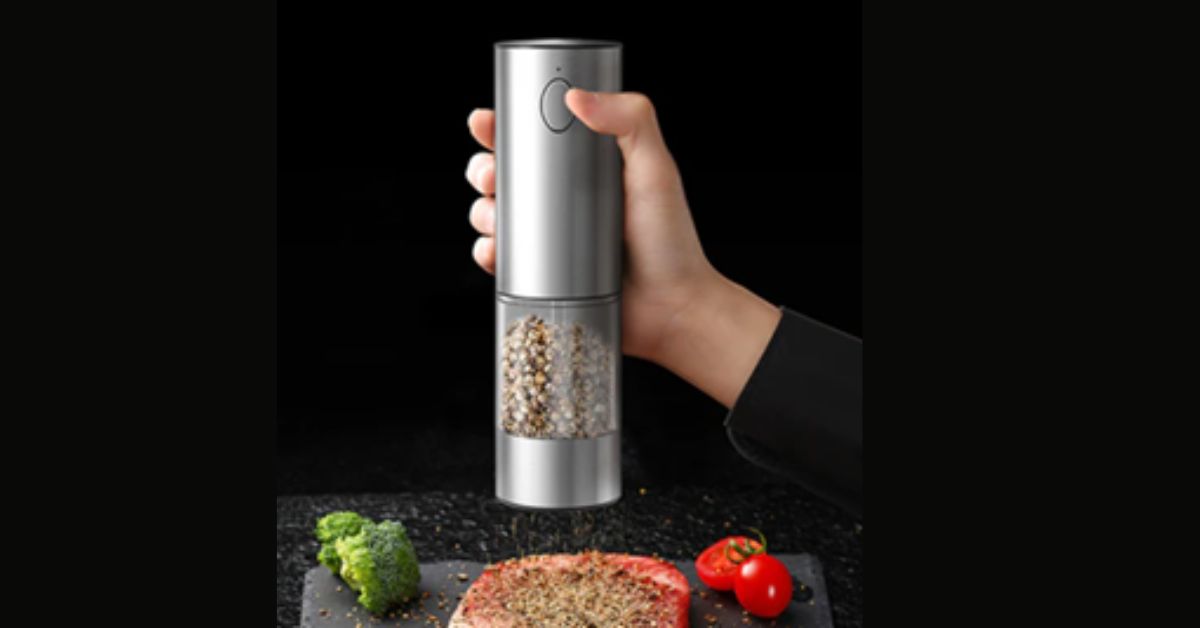HOME IMPROVEMENT
Electric vs. Manual Pepper Grinders: Which Is Better?

Choosing the right pepper grinder can significantly impact your cooking experience, from seasoning accuracy to ease of use. Electric and manual pepper grinders each offer distinct advantages, making one more suitable for certain kitchens than the other. Electric grinders, like the SCHWUA Rechargeable pepper grinder electric, provide effortless, one-press grinding with adjustable settings for various particle sizes. This type appeals to those who prioritize convenience and precision.
On the other hand, manual grinders allow you to control the grind consistency manually, often favored by cooks who enjoy a more hands-on approach to seasoning. The choice ultimately boils down to your cooking habits, budget, and personal preference. This guide explores the key differences, pros, and cons of electric and manual grinders, helping you make an informed decision that aligns with your kitchen needs and culinary goals.

What Are the Key Differences Between Electric and Manual Pepper Grinders?
When deciding between electric and manual pepper grinders, understanding the fundamental differences is essential. Each type has unique features that influence performance, grind quality, and ease of use.
Operation and Convenience
Electric grinders are designed for maximum convenience. With a one-press automatic grinding function, you can season dishes seamlessly, focusing on cooking without the repetitive twisting motion required by manual grinders. Additionally, electric models often feature modern, sleek designs and rechargeable batteries, allowing for thousands of uses per charge. They’re ideal for busy kitchens where speed and ease are priorities.
In contrast, manual grinders require a bit of elbow grease, offering a more hands-on experience. Some chefs prefer the control manual grinders provide, as they allow you to feel connected to the seasoning process. The manual process might be slower but is simple and effective, especially for small amounts of seasoning.
Grind Consistency and Control
Grind consistency is crucial for flavor and texture. Electric grinders typically come with adjustable settings enabling you to choose between fine or coarse grinds easily. With a ceramic grinder, electric models can deliver precise, uniform results, which is essential for consistent seasoning across dishes.
Manual grinders also allow for control but often depend on the user’s strength and technique, which can vary. They usually come with adjustable settings but may require a bit more trial and error to achieve the desired consistency. For those who want exact control over each grind, an electric model may provide a more reliable solution.
Pros and Cons of Electric Pepper Grinders
Electric pepper grinders bring innovative features to the kitchen but come with specific considerations.
Advantages
Electric grinders are synonymous with ease of use. One press is all it takes to start grinding, freeing up your other hand for cooking tasks. Models like the SCHWUA Rechargeable Electric Grinder feature LED lights for precision, ensuring you can see exactly how much seasoning you’re adding, even in dim lighting. Additionally, the rechargeable design eliminates the need for constant battery changes, saving costs and reducing waste. With sturdy stainless steel construction and a ceramic grinding mechanism, electric grinders offer durability, grind consistency, and a sleek design that complements modern kitchens.
Disadvantages
Despite the convenience, electric grinders come with drawbacks. They can be pricier than manual grinders due to the technology and materials involved. Some users may find the need to recharge batteries inconvenient, particularly if the grinder is used frequently. Additionally, electric grinders can be bulkier, making them less portable and harder to store in compact kitchens. They may also have limitations in grind options compared to high-end manual grinders, and they require extra care during cleaning due to their electronic components. But if you can check the SCHWUA Rechargeable Electric Pepper Grinder in Stainless Steel, which you don’t need to worry about the battery and other things, order right now, even can help you save 10%.
Pros and Cons of Manual Pepper Grinders
Manual pepper grinders offer traditional appeal but come with unique strengths and limitations.
Advantages
Manual grinders provide direct control over the grind size, making them ideal for those who prefer a hands-on seasoning approach. Unlike electric models, they’re usually compact and lightweight, allowing for easy portability and storage. They’re also highly durable, requiring minimal maintenance as they contain no electronic components. Additionally, manual grinders are typically more affordable, making them a cost-effective choice for many home cooks. For those who value simplicity and control, a manual grinder is a timeless option.
Disadvantages
However, manual grinders do require physical effort, which can be tiring when grinding large amounts of pepper. Achieving a consistent grind may take more practice, as the quality often depends on the user’s strength and technique. Manual models may also lack features such as LED lights or precise, adjustable settings, found in electric models. For cooks who prioritize convenience and quick seasoning, a manual grinder might feel slower and less efficient.
How to Choose the Right Pepper Grinder for Your Kitchen
Finding the perfect pepper grinder depends on several factors, including cooking habits, budget, and maintenance preferences.
Assessing Your Cooking Habits and Needs
Consider how often you use pepper and the volume you need. If you frequently cook for larger groups or prefer quick seasoning, an electric grinder’s one-press functionality can be highly beneficial. However, if you enjoy a more interactive approach to cooking or prefer simple tools, a manual grinder might better suit your style.
Considering Budget and Maintenance
Electric grinders tend to be more expensive and require periodic charging or battery replacements, which can add to long-term costs. Manual grinders, on the other hand, are often cheaper and simpler to maintain. If budget and ease of maintenance are priorities, a manual grinder may be the practical choice. However, for those willing to invest in convenience, an electric grinder provides extra features and durability.

Conclusion
Choosing between an electric and manual pepper grinder ultimately depends on your preferences and kitchen needs. Electric grinders, like the SCHWUA model, excel in convenience and precision, offering hands-free grinding and adjustable settings for diverse cooking requirements. They’re ideal for busy kitchens where speed and ease are prioritized.
Manual grinders, however, offer a tactile, hands-on experience, preferred by those who enjoy direct control over the seasoning process. They’re more affordable and simpler to maintain, making them perfect for traditional cooks or those with a limited budget. Both types have pros and cons, but understanding your cooking style and priorities will guide you to the best choice for your kitchen. Whether you lean towards electric or manual, a quality pepper grinder enhances flavor and adds a touch of finesse to your culinary creations.
HOME IMPROVEMENT
Navigating the Market for Used Spray Rigs: A Comprehensive Guide

Used spray rigs can be an excellent investment for businesses looking to expand their capabilities in insulation, roofing, or specialty coatings without the hefty price tag of new equipment. We will explore everything from the benefits of opting for used equipment to the critical considerations one must make to ensure a wise purchase.
The Appeal of Used Spray Rigs
Opting for used spray rigs offers several attractive benefits. The most obvious is cost savings. Used rigs can be significantly cheaper than their new counterparts, making them an appealing option for startups or businesses looking to minimize capital expenditures. Additionally, the depreciation on used equipment is considerably less steep, which means it retains more of its value should you decide to sell it later. Purchasing used equipment also allows quicker acquisition since you typically bypass the manufacturing lead times associated with new equipment orders.
Evaluating the Condition of Used Spray Rigs
When considering a used spray rig, the most critical factor is the condition of the equipment. It’s essential to thoroughly inspect the rig, ideally with the help of a knowledgeable technician. Check for signs of wear and tear, potential damage, and the overall operational status of the machine. Assess the condition of key components like the spray guns, hoses, and the proportioner. Ensure the equipment has been well-maintained and inquire about any recent repairs or part replacements. A well-maintained used rig can offer reliability close to that of a new one at a fraction of the cost.
Where to Find Used Spray Rigs
Finding quality used spray rigs requires knowing where to look. One of the best places to start is specialty equipment resellers focusing on selling used construction and industrial machinery. These vendors often understand the equipment well and can provide a history of the rig’s usage and maintenance. Online marketplaces and auctions are another avenue, though they may require more diligence to ensure the equipment meets your standards. Networking with industry contacts can also lead to great deals on used spray rigs for sale.
Key Features to Check Before Purchase
Before purchasing a used spray rig, several key features require close inspection to ensure they meet the operational demands of your projects. The proportioner should function efficiently at the correct temperatures and pressures. Hoses should be free of cracks and leaks, while spray guns should deliver a consistent spray pattern. Check the electrical and mechanical systems to ensure they are in good working order, and pay attention to the rig’s trailer or chassis, which should be structurally sound and rust-free.
The Importance of a Reliable Seller
The reliability of the seller is crucial when purchasing used equipment. A reputable seller should provide transparent information about the rig’s history, including its age, usage, maintenance records, and any significant repairs. They should be willing to allow a thorough inspection of the rig and possibly even a demonstration to prove its functionality. Buying from established and respected sellers can decrease the likelihood of encountering issues with the equipment after purchase.
Potential Costs of Refurbishment
While purchasing a used spray rig can save money initially, it’s important to consider potential refurbishment costs. Depending on the rig’s condition, you might need to invest in repairs or upgrades soon after purchase. Factor in the costs of replacing hoses, repairing spray guns, or updating the proportioning system to ensure the rig meets your needs. Setting aside a budget for these potential expenses will help determine the cost of purchasing a used rig.
Warranty and Support Issues
Unlike new equipment, used spray rigs often have limited or no warranty. Any malfunctions or breakdowns will likely be your responsibility to fix, potentially adding to the overall cost of ownership. It’s important to discuss support options with the seller, whether they offer any guarantees or after-sale support, and if not, plan for how you will manage repairs and maintenance. Having a reliable service technician or a good relationship with a local equipment repair shop can mitigate some of these risks.
Financing Options for Used Spray Rigs
Financing used equipment can be more challenging than financing new equipment due to the increased risk perceived by lenders. However, many equipment financing companies offer loans or leases for used equipment purchases. These financing options can help spread the cost of the rig over time, making it more manageable. Shop for financing options to find terms that best suit your business’s cash flow and financial status.
Making the Decision: New vs. Used Spray Rigs
Deciding whether to invest in a new or used spray rig often comes down to comparing the immediate cost savings of used equipment against the long-term benefits of new. Consider factors such as the expected lifespan of the rig, potential downtime due to repairs, and the importance of technological advancements included in newer models. For some businesses, the latest technology and the peace of mind of a warranty are worth the extra investment. For others, the cost savings of a used rig align better with their financial strategy.
Investing in a used spray rig can be a smart financial decision for many businesses, offering significant savings and immediate availability. However, careful consideration of the rig’s condition, potential additional costs, and the seller’s reliability is required. By conducting thorough research and inspections, negotiating wisely, and preparing for additional maintenance investments, businesses can greatly benefit from the advantages of used spray rigs while minimizing the risks.
HOME IMPROVEMENT
Comprehensive Guide to Chimney Cap Maintenance and Repair

Chimney caps are vital in maintaining the safety and efficiency of your home’s heating system. These caps are designed to cover the top of your chimney flue. They prevent animals, debris, and water from entering the chimney, which can cause blockages or damage. Additionally, they help prevent sparks or embers from escaping the chimney and potentially starting a fire on your roof or nearby combustible materials. Regular maintenance of your chimney cap is crucial as it helps avoid costly repairs and extends the life of your chimney. For residents experiencing issues with their chimney caps, seeking professional chimney cap repair in Portland ensures that all repairs are conducted with high standards and quality materials.
Identifying Common Issues with Chimney Caps
Common issues with chimney caps include rusting, corrosion, and physical damage such as dents or dislodgement. Rust and corrosion can occur due to exposure to the elements, especially in areas with high humidity or coastal regions where salt is present. Physical damage can occur from severe weather conditions such as high winds or heavy snowfall. It’s also common for chimney caps to become loose over time, which can compromise their functionality. Regular inspections can help identify these issues early, preventing further damage to your chimney system.
Materials Used in Chimney Caps: Pros and Cons
Chimney caps are typically made from metals like galvanized steel, stainless steel, or copper. Galvanized steel is cost-effective but prone to rust over time, diminishing its durability. Stainless steel offers better resistance to rust and corrosion, making it a more reliable choice for chimney caps, although it is more expensive. Copper is the most durable and aesthetically pleasing option, but it comes at a higher cost and requires regular polishing to maintain its shiny appearance. Choosing the right material depends on your budget, the climate of your area, and how often you are willing to perform maintenance.
Step-by-Step Guide to Inspecting a Chimney Cap
Inspecting your chimney cap is a straightforward process that you can do yourself or with the help of a professional. Begin by visually examining the cap from the ground to see if there are any obvious signs of damage or wear. Use binoculars if necessary. If it looks intact, use a ladder to get a closer view. Check for rust and corrosion, and ensure the cap is securely attached to the flue. Look inside the flue to see if any blockage is visible from the top. If you are uncomfortable performing this inspection independently, consider hiring a professional to ensure it is done safely.
Tools and Materials Needed for DIY Chimney Cap Repair
For DIY chimney cap repair, you will need basic tools and materials, including a hammer, pliers, wire brush, and appropriate sealants or paints, depending on the material of your cap. For example, if you have a galvanized steel cap, you might need rust-inhibiting paint to treat areas where rust has formed. Stainless steel caps only require cleaning and tightening, whereas copper caps need polishing and lacquering to restore appearance. Always ensure you have the correct safety gear, such as gloves, goggles, and a sturdy ladder.
Professional Repair Services: When to Call in the Pros
While many aspects of chimney cap maintenance can be handled on a DIY basis, there are times when it’s advisable to call in professionals. This is particularly true if the damage to your chimney cap is extensive or if the cap requires complete replacement. Professionals can also help in cases where the chimney has been damaged or if there are signs of blockage you cannot clear yourself. Hiring a professional can ensure that all parts of your chimney system are in optimal working condition and safe to use.
Long-Term Maintenance Strategies for Chimney Caps
Implement a routine maintenance schedule to ensure the longevity and effectiveness of your chimney cap. This includes regular inspections and immediate repairs of any small issues before they become major problems. Consider treating metal chimney caps with rust inhibitors or applying waterproof sealants to prevent water damage. It is also advisable to clean your chimney and cap annually to remove soot, debris, and creosote buildup, which can affect the performance of your heating system and pose a fire hazard.
The Role of Chimney Caps in Home Safety
Ultimately, chimney caps play a crucial role in maintaining your home’s safety. They prevent the ingress of rainwater, which can lead to structural damage and mold growth within your chimney. They also block animals from nesting in the chimney, which can cause blockages and hazardous conditions. Chimney caps reduce the fire risk by keeping embers contained, protecting your home and its occupants. Regular maintenance and prompt repair of your chimney cap are essential to ensure your home remains safe and your heating system operates efficiently throughout the year.
HOME IMPROVEMENT
Designing Functional Spaces: Exploring Carriage House Floor Plans

Carriage house floor plans are detailed blueprints that outline the layout and design of carriage houses, versatile structures that serve various purposes such as garages, guesthouses, studios, or rental units. These floor plans provide essential guidance for architects, builders, and homeowners to visualize and execute the construction of carriage houses according to specific needs and preferences. Homeowners can maximize their creativity and find the perfect layout by taking the time to explore different carriage house floor plans.
Types of Carriage House Floor Plans
Several types of carriage house floor plans are available, each catering to different requirements and lifestyles. Traditional floor plans typically feature a two-story design, with a garage on the ground floor and living quarters or storage space above. Modern floor plans may include single-story or multi-level layouts with open-concept living spaces, gourmet kitchens, and luxurious amenities. Additionally, some floor plans incorporate additional features such as balconies, decks, or rooftop gardens to maximize outdoor living space.
Layout and Space Utilization
A carriage house floor plan layout is crucial for maximizing space utilization and functionality. Efficient floor plans prioritize open flow between rooms, with designated living, dining, cooking, and sleeping areas. Ample storage space, including closets, cabinets, and built-in shelving, helps minimize clutter and maintain organization. Flexibility in design allows for customization according to individual needs, whether creating a home office, a fitness area, or a rental unit for supplemental income.
Architectural Styles and Aesthetic Appeal
Carriage house floor plans come in various architectural styles, from traditional to contemporary, to suit different tastes and preferences. Classic styles may feature elements such as pitched roofs, dormer windows, and decorative trim, evoking a sense of nostalgia and charm. On the other hand, modern styles may incorporate clean lines, minimalist design, and sleek finishes for a more contemporary look and feel. By selecting the right architectural style, homeowners can enhance their carriage house’s aesthetic appeal and overall ambiance.
Integration with Main Residence
Carriage house floor plans are often designed to complement the architecture and style of the main residence, creating a cohesive and harmonious aesthetic. Integration with the main residence may involve matching exterior finishes, coordinating rooflines, and maintaining consistent architectural details. Additionally, the thoughtful placement of the carriage house on the property ensures privacy and visual harmony while maximizing views and natural light. Whether attached or detached, the carriage house should feel like a seamless extension of the main residence, enhancing the property’s overall value and curb appeal.
Accessibility and Universal Design
Accessibility is an essential consideration in carriage house floor plans, ensuring that the space is usable and enjoyable for people of all ages and abilities. Universal design principles may include wider doorways, zero-step entries, lever door handles, and accessible bathrooms with grab bars and roll-in showers. These design elements promote safety, convenience, and independence for homeowners and guests, regardless of mobility limitations. By incorporating universal design principles into carriage house floor plans, homeowners can create inclusive and welcoming spaces that accommodate diverse needs and lifestyles.
Energy Efficiency and Sustainable Design
Carriage house floor plans can incorporate energy-efficient and sustainable design principles to minimize environmental impact and reduce utility costs. This may include high-performance insulation, energy-efficient windows and doors, passive solar design, and renewable energy systems like solar panels or geothermal heating. By optimizing energy efficiency, carriage houses can operate more sustainably and affordably, benefiting both the environment and homeowners’ wallets. Sustainable materials and construction practices also contribute to healthier indoor air quality and long-term durability, ensuring that the carriage house remains a comfortable and environmentally responsible living space for years.
Outdoor Living Spaces and Landscaping
Carriage house floor plans often include outdoor living spaces and landscaping features to enhance the overall functionality and enjoyment of the property. This may include patios, decks, or courtyard gardens for outdoor entertaining, relaxation, and recreation. Thoughtful landscaping with native plants, trees, and shrubs enhances curb appeal and promotes biodiversity, water conservation, and ecological resilience. Homeowners can create inviting and sustainable environments that blur the line between indoor and outdoor living by integrating outdoor living spaces and landscaping into carriage house floor plans.
Carriage house floor plans offer homeowners a flexible and customizable solution for creating additional space on their property. By exploring different types of floor plans, considering layout and space utilization, selecting architectural styles, integrating with the main residence, prioritizing accessibility and universal design, promoting energy efficiency and sustainable design, and incorporating outdoor living spaces and landscaping, homeowners can design carriage houses that meet their unique needs and preferences. With careful planning, attention to detail, and collaboration with architects and builders, carriage house floor plans can transform visions into reality, creating functional, beautiful, and harmonious spaces that enhance the overall value and enjoyment of the property.

 BUSINESS1 year ago
BUSINESS1 year agoExploring the Benefits of Commercial Printing

 HOME IMPROVEMENT12 months ago
HOME IMPROVEMENT12 months agoThe Do’s and Don’ts of Renting Rubbish Bins for Your Next Renovation

 BUSINESS12 months ago
BUSINESS12 months agoBrand Visibility with Imprint Now and Custom Poly Mailers

 HEALTH8 months ago
HEALTH8 months agoThe Surprising Benefits of Weight Loss Peptides You Need to Know

 TECHNOLOGY10 months ago
TECHNOLOGY10 months agoDizipal 608: The Tech Revolution Redefined

 HEALTH8 months ago
HEALTH8 months agoYour Guide to Shedding Pounds in the Digital Age

 HOME IMPROVEMENT8 months ago
HOME IMPROVEMENT8 months agoGet Your Grout to Gleam With These Easy-To-Follow Tips

 HEALTH11 months ago
HEALTH11 months agoHappy Hippo Kratom Reviews: Read Before You Buy!












